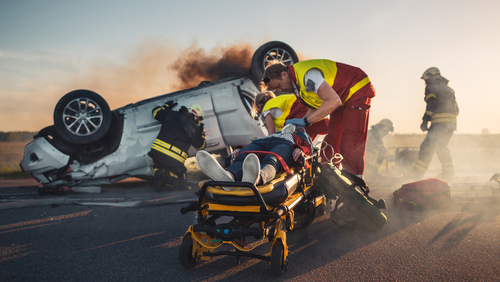Navigating Auto Accident Claims
Car crashes are incredibly common and happen daily nationwide. In fact, in a recent report done by NHTSA, car accidents are currently the leading cause of injury and death in the United States. There are at least 7.3 million motor vehicle accidents annually which works out to 19,937 crashes with 118 deaths daily, 831 motor vehicle accidents per hour, 14 wrecks a minute and 2 auto crashes every 10 seconds.
Where there are cars, there are bound to be accidents and Florida is not different. In the preliminary data from the Florida Department of Highway Safety and Motor Vehicles in 2022 there were:
- 381,156 total crashes across the state
- 242,622 injuries from all crashes
- 3,292 fatalities from all crashes
- 9,741 crashes involving pedestrians resulting in 693 fatalities
- 102,568 hit-and-run crashes, resulting in 255 fatalities and 22,309 injuries
In later reporting, the year 2023 is no stranger to the commonality of auto accidents. The reports show that in Florida alone there have already been:
- 1,808 fatalities from all crashes
- 134,523 injuries from all crashes
- 56,496 hit-and-run crashes: 139 hit-and-run fatalities, 12,194 hit-and-run injuries
While some can certainly be minor, approximately 40% of accidents in Florida alone result in injuries. The most common injuries from auto accidents are traumatic brain injuries, spinal cord injuries, back injuries, burns, internal injuries, fractures, broken bones, disfiguring scars, limb loss, neck injuries, whiplash, soft tissue injuries, and PTSD.

While there are more reported injuries annually, Florida has a rate of 1.60 deaths per 100 million miles. This is calculated when comparing the risk of accident fatalities from state to state and comparing the number of deaths per 100 million miles traveled according to IIHS.
Car accidents can occur for a variety of reasons. In Florida specifically, some of the most common reasons, according to the FLHSMV report, are: speeding, distracted driving, weather conditions, and fatigue. In general other reasons could include:
- Driving under the influence
- Hit and runs
- Reckless driving: Running red lights, not stopping at stop signs, excessive lane changing, improper passing
- Aggressive driving aka “road rage”
- Road conditions
- Vehicle defects
- Night driving
- Construction sites
- Wrong-way driving
While car accidents can cause confusion upon happening, there are some actions you can take after getting into your accident to better your chance of receiving compensation.
- Call 911: calling 911 should be done after any type of accident regardless of severity especially if the accident causes personal injury, death, or over $500 worth of property damage. Getting a police report that clearly states what happened helps when it comes to processing claims.
- Take Photos & Get Details: if able, take photos of the scene, injuries, and property damage to provide evidence regarding the position of vehicles, damage caused by the accident, and any relevant environmental conditions. In addition, if you need to write down relevant details of the accident such as time, make and model of vehicles, names and contact information of drivers and passengers, and any other relevant evidence.
- Insurance: contact your insurance provider immediately and keep them informed of any progress regarding the accident. If you are not comfortable with this or feel an attorney would better navigate the situation, talk to one beforehand.
- Medical Treatment: if you sustained injuries from an accident, seek medical treatment immediately and provide the medical records to either your insurance or attorney.
- Document: keep documentation for any medical bills, car repair costs, resisted costs of conducted care, or other financial losses based on how you were affected.
If you or a loved one has been affected by a crash, contact us at the Law Offices of Bram J. Gechtman. We understand how devastating and inconvenient auto accidents can be. Our team of experienced attorneys can help get you the compensation you deserve to help cover damage, medical bills, pain and suffering, and loss of wages.




